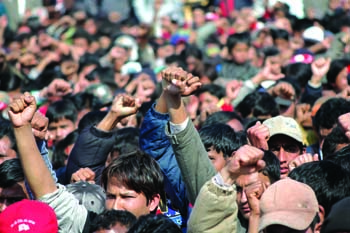 |
Whoever is now chosen to lead a reformed, united trade union, it will not settle the larger question of whether the largest party in the country can keep itself from falling apart. Whatever the driving forces � external and internal manipulation, ideological schisms, egoism, media sensationalism � even the most diehard Maoist supporter is compelled to concede that the Maoist party has a serious internal problem on its hands. Indeed, most such diehard supporters, the cadre, have already chosen sides. Those whose maintain that every communist party's revolutionary spirit derives from the ferment of debate, and that UCPN (Maoist) is no different, is either lying or blinkered to the realities of revolutionary communism. It is as much wishful thinking as that indulged in by of those who do wish to see the Maoists split.
It's hardly a surprise either. After all, parties from the full range of Nepal's political spectrum have and will continue to endure splits based purely on a lust for power and paisa. The Maoists have the added complication of ideology to deal with. You can't sit on the sharp fence of revolution for very long without being accused of being an extremist or a reactionary.
But we should worry about the consequences. Many will rub their hands in glee at the prospect of a Maoists split even if they only continue to stumble along in strife, for there is no doubt that they are not doing themselves or their support base a favour. The rest of the political establishment and India are obvious candidates for schadenfreude, but a fair section of the media, the business community, and the rest of the Kathmandu elite would like no better than to see the fragmentation of the Maoist party fragmented.
But is Nepal better off with a monolithic Maoist party that is reluctant to reform, but which at least makes some effort to engage with the rest of the establishment, and which still represents one half of a peace process that it has not quite abandoned? Or do we want a split that, let no one be in any doubt, would be far more significant than previous splinters, and which could leave us with two or three still large and powerful parties? At least one of these parties will then resort to unbridled radicalism to claim the revolutionary mantle.
In the short term, the aforementioned stakeholders will probably fancy their chances with a Maoist split, in as much as the Maoist party will be weakened. In the medium term, a split would do nothing for the peace process and the constitution. In the long term, a split, and the inevitable exclusion of the radicals, could fuel the basis for yet another damaging conflict. Be careful what you wish for.


